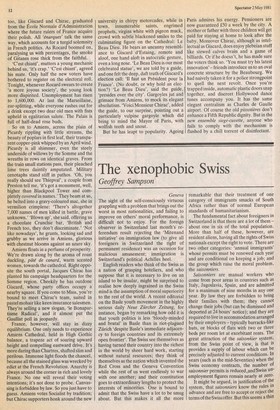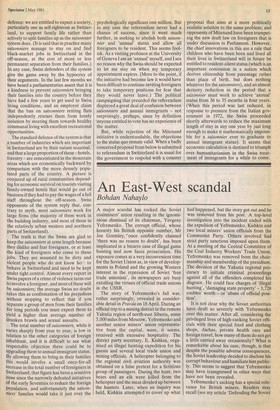The xenophobic Swiss
Geoffrey Sampson
Geneva The sight of the self-consciously virtuous grappling with a problem that brings out the worst in most nationalities, and failing to improve on others' moral performance, is difficult not to enjoy. For the foreign observer in Switzerland last month's referendum result rejecting the `Mitenand initiative' on immigration law (to give all foreigners in Switzerland the right of permanent residence) was an occasion for malicious amusement; immigration is Switzerland's political Achilles heel.
English readers who think of the Swiss as a nation of grasping hoteliers, and who suppose that it is necessary to live on an island to be insular, might be surprised to realise how deeply ingrained in the Swiss mind is the assumption of moral superiority to the rest of the world. A recent editorial on the Basle youth movement in the highly serious daily Neue Zurcher Zeitung, for instance, began by remarking how odd it is that youth politics is less `bloody-minded and brutal' in Basle than in riot-plagued Zurich 'despite Basle's immediate adjacency to foreign• countries and its extremely open frontier'. The Swiss see themselves as having turned their country into the richest in the world by sheer hard work, starting without natural resources; they think of themselves as the nation which invented the Red Cross and the Geneva Convention while the rest of us went endlessly to war with one another; and their constitution goes to extraordinary lengths to protect the interests of minorities. One is bound to admit that the Swiss have a lot to be smug about. But this makes it all the more remarkable that their treatment of one category of immigrants smacks of South Africa rather than of normal European standards of humanitarianism.
The fundamental fact about foreigners in Switzerland is that there are a lot of them — about one in six of the total population. More than half of these, however, are resident aliens, having all the rights of Swiss nationals except the right to vote. There are two other categories: 'annual immigrants' whose permits must be renewed each year and are conditional on keeping a job; and the group which raise the moral problem, the saisonniers.
Saisonniers are manual workers who come from poor areas in countries such as Italy, Jugoslavia, Spain, and are admitted for a maximum of nine months in any one year. By law they are forbidden to bring their families with them; they cannot change their jobs (but can be dismissed and deported at 24 hours' notice); and they are required to live in accommodation arranged by their employers — typically barracks-like huts, or blocks of flats with two or three beds per room let at exorbitant rents. The great attraction of the saisonnier system, from the Swiss point of view, is that is provides a supply of labour which can be precisely adjusted to current conditions. In years (such as the mid-Seventies) when the Swiss economy contracts, the number of saisonnier permits is reduced,,and,ISwiss unemployment figures remain nearly at zero. It might be argued, in justification of the system, that saisonniers know the rules in advance and are free to accept or reject the terms of theSwiss offer. But this seems a thin defence: we are entitled to expect a society, particularly one as self-righteous as Switzerland, to support family life rather than actively to split families up as the saisonnier system does. (It is said that in practice many saisonniers manage to stay on and find black-market jobs in Switzerland in the off-season, at the cost of more or less permanent separation from their families.) In any case, Swiss defenders of the system give the game away by the hypocrisy of their arguments. In the last few months we have heard a parliamentarian assert that it is a kindness to prevent saisonniers bringing their families into the country before they have had a few years to get used to Swiss living conditions, and an employer claim that the ban on saisonniers renting flats independently rescues them from lonely isolation by steering them towards healthy communal living with excellent recreational opportunities.
The standard defence of the system is that a number of industries which are important in Switzerland are by their nature seasdnal, and that a large proportion of these hotels, forestry — are concentrated in the mountain areas which are economically backward by comparison with the more densely populated parts of the country. A picture is conjured up of rural communities depending for economic survival on tourists visiting family-owned hotels that would go out of business if they had to pay the wages of a full staff throughout the off-season. Swiss opponents of the system reply that, contrary to myth, most saisonniers work for large firms (the majority of them work in the building industry, and most of those in the relatively urban western and northern parts of Switzerland).
The truth is that the 'Swiss are glad to keep the saisonniers at arms length because they dislike and fear foreigners, or at least the kind of foreigners who come to these jobs. They are assumed to be dirty and violent people who do not know ho— to behave in Switzerland and need to be kept under tight control. Almost every report in Swiss papers of a crime of violence turns out to involve a foreigner, and most of these will be saisonniers; the average Swiss no doubt takes this as confirmation of his prejudices without stopping to reflect that if you separate a group of men from their families for long periods you must expect them to yield a higher than average number of drunken brawls and sexual assaults.
The total number of saisonniers, while it varies sharply from year to year, is low in relation to the other categories of foreign inhabitant, and it is difficult to see what respectable objection there could be to Upgrading them to annual immigrant status. By allowing them to bring in their families this would involve a small once-for-all increase in the total number of foreigners in Switzerland; that figure has been a sensitive issue since the narrowly defeated initiatives of the early Seventies to reduce the foreign Population, and unfortunately the saisonniers' families would take it just over the psychologically significant one million. But in any case the referendum never had a chance of success, since it went much further, in seeking to abolish both saisonnier and 'annual' status and allow all foreigners to be resident. This seems foolish. As a visiting professor at the University of Geneva I am an 'annual' myself, and I see no reason why the Swiss should be expected to let me stay on when my temporary appointment expires. (More to the point, if the initiative had become law it would have been difficult to continue inviting foreigners to take temporary positions for fear that they would never leave.) The political campaigning that preceded the referendum displayed a great deal of confusion between saisonniers and annual immigrants — not surprisingly, perhaps, since by definition 'anyone entitled to vote has no experience of the matter.
But, while rejection of the Mitenand initiative is understandable, the objections to the status quo remain valid. When a badly conceived proposal from below is submitted to referendum in Switzerland it is usual for the government to respond with a counter proposal that aims at a more politically realistic solution to the same problem; and opponents of Mitenand have been trumpeting the new draft law on foreigners that is under discussion in Parliament. However, the chief innovations in this are a rule that children who have been born and lived all their lives in Switzerland win in future be entitled to resident-alient status (which is an important concession in a nation which derives citizenship from parentage rather than place of birth, but does nothing whatever for the saisonniers), and an almost derisory reduction in the period that a saisonnier must work to achieve 'annual' status from 36 to 35 months in four years. (When this period was last reduced, in response to pressure from the Italian government in 1972, the Swiss proceeded shortly afterwards to reduce the maximum length of stay in any one year by just long enough to make it mathematically impossible for a saisonnier ever to graduate to annual immigrant status). It seems that economic calculation is destined to triumph over humanitarianism in the Swiss treatment of immigrants for a while to come.



















































































 Previous page
Previous page